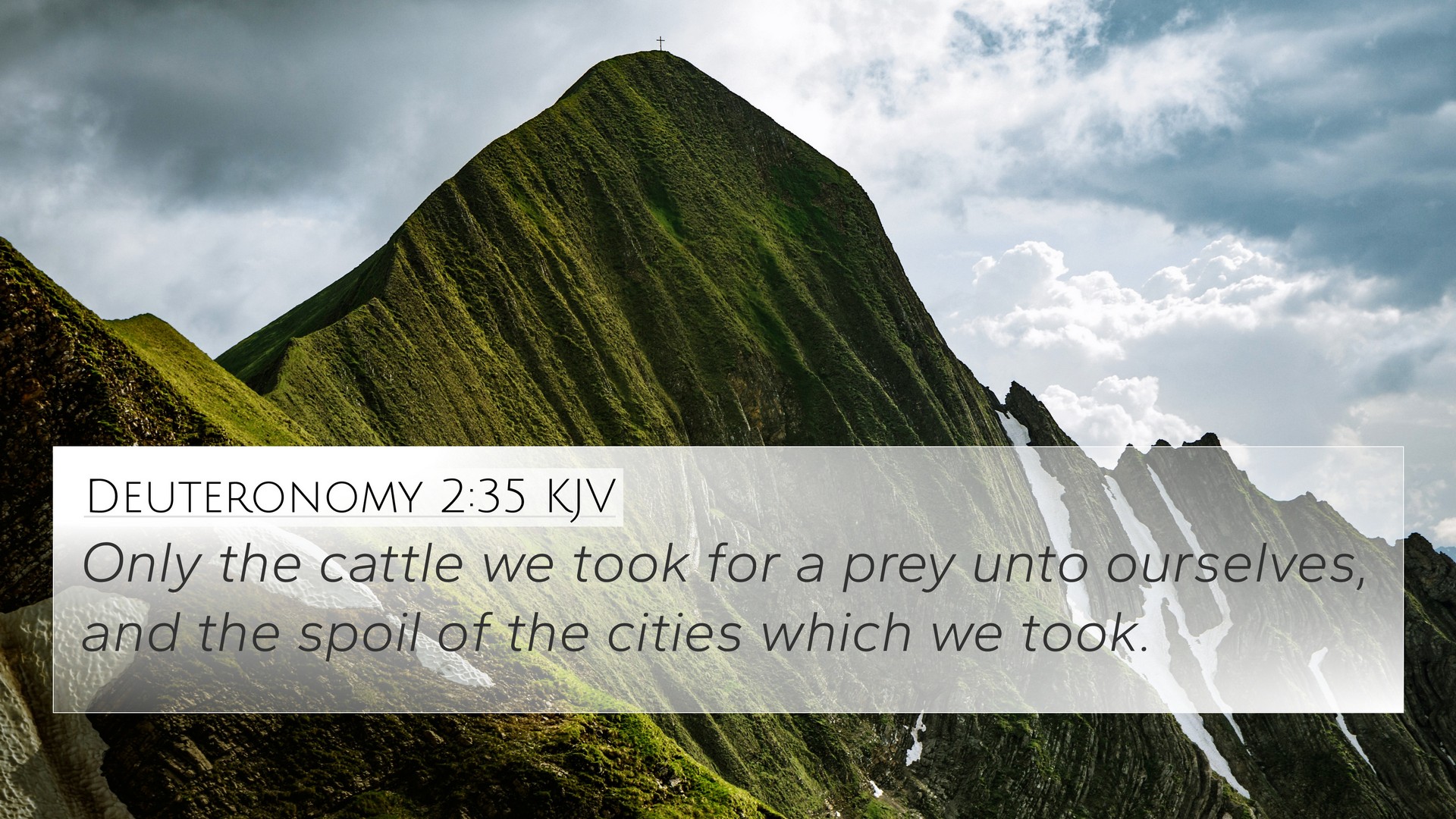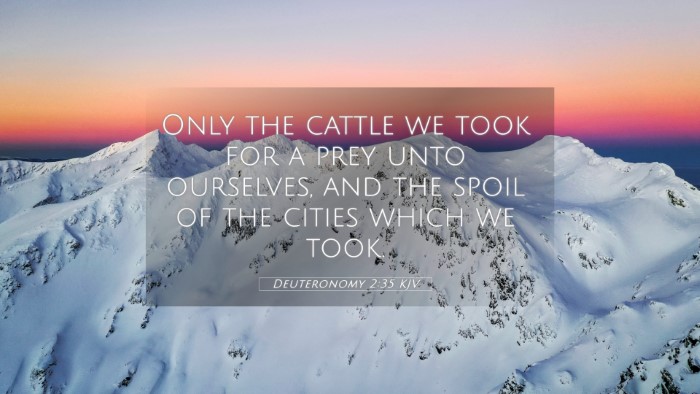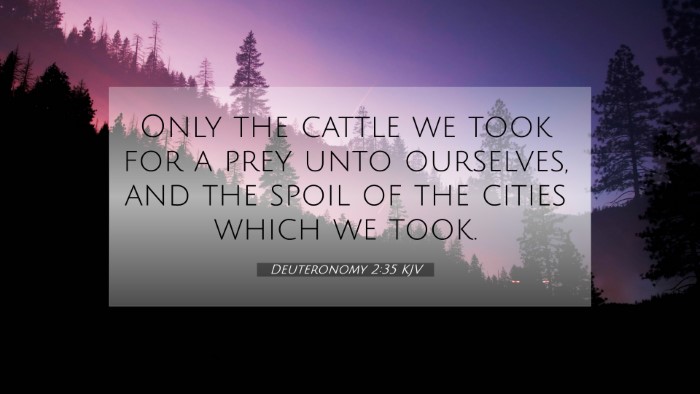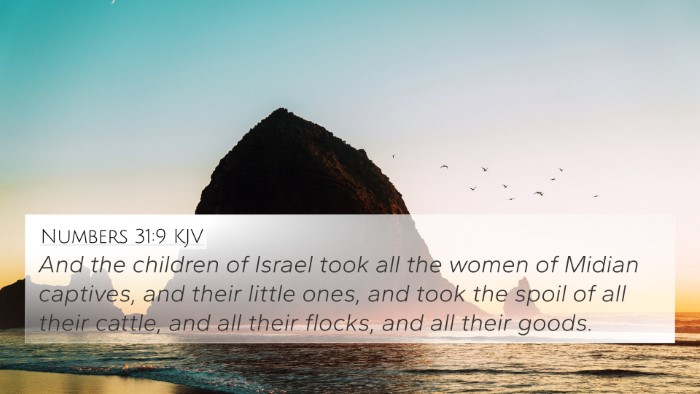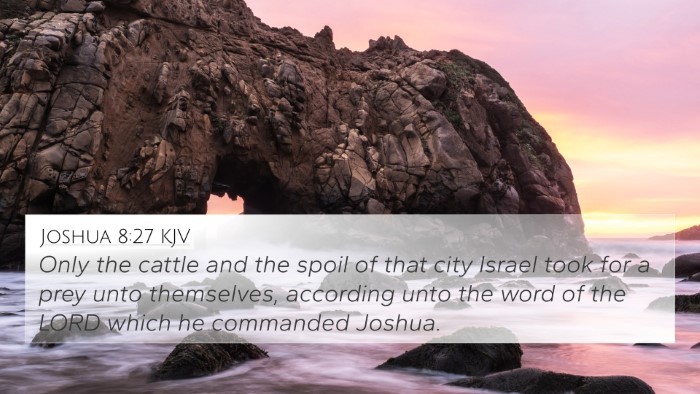Deuteronomy 2:35 - Meaning and Insights
Deuteronomy 2:35 states, "And we took all his cities at that time, and utterly destroyed the men, women, and children of every city; we left none to remain." This verse captures a significant moment in Israel's history as they prepare to enter the Promised Land. Below, we delve into the implications and meanings derived from this verse, synthesizing insights from noted public domain commentaries.
Contextual Background
The passage belongs to the narrative of Israel's journey through the wilderness and their conquests under Moses' leadership. The broader context is essential for understanding the gravity and justification of the actions described in this verse.
Historical Significance
Matthew Henry emphasizes the need to understand the historical context of Israel's conquests, indicating that these actions were part of God's judgment against the wickedness of those nations. Albert Barnes adds to this by noting that God commanded these actions as a means to purify the land for His people.
Theological Implications
Adam Clarke addresses the theological implications of this verse. He explains that these actions illustrate God's sovereignty over nations and His rights to judge due to moral corruption. The verse brings to light the difficult themes of divine justice and the eradication of evil.
Cross-References
To fully appreciate Deuteronomy 2:35, we can identify several cross-references that connect this verse to other significant biblical themes and narratives:
- Joshua 6:21 - "And they utterly destroyed all that was in the city, both man and woman, young and old". This passage reflects similar instructions given to the Israelites regarding the conquest of Jericho.
- 1 Samuel 15:3 - "Now go and smite Amalek, and utterly destroy all that they have, and spare them not". Here, the command to destroy the enemy and all associated with them is reiterated.
- Romans 9:22 - "What if God, willing to show His wrath and to make His power known, endured with much longsuffering the vessels of wrath fitted to destruction?". This verse speaks to God's sovereignty and the purpose behind His judgment.
- Matthew 5:5 - "Blessed are the meek: for they shall inherit the earth". This verse contrasts the destruction of the wicked with the future inheritance of the earth by the meek.
- Numbers 21:3 - "And the Lord hearkened to the voice of Israel, and delivered up the Canaanites; and they utterly destroyed them and their cities". This reflects the ongoing theme of divine assistance in Israel's battles.
- Deuteronomy 7:2 - "And when the Lord thy God shall deliver them before thee; thou shalt smite them, and utterly destroy them; thou shalt make no covenant with them, nor show mercy unto them". This verse reiterates God's command to destroy nations inhabiting the land promised to Israel.
- Hebrews 11:30 - "By faith the walls of Jericho fell down, after they were compassed about seven days". Cross-reference the act of faith that led to destruction.
- 2 Peter 2:6 - "And turning the cities of Sodom and Gomorrha into ashes condemned them with an overthrow, making them an example unto those that after should live ungodly". This speaks to the theme of divine judgment against sinful nations.
- Proverbs 14:34 - "Righteousness exalteth a nation: but sin is a reproach to any people". This verse succinctly highlights the consequences of sin on a national level.
Understanding God’s Justice
Both Matthew Henry and Albert Barnes underscore that the destruction was not merely an act of war but was deeply tied to God's justice. The destruction served as a warning to the nations about the consequences of sin and disobedience to God.
Ethical Considerations
Within modern discussions, ethical considerations arise from these texts. Adam Clarke warns readers to approach this topic with humility, recognizing the complexities of divine judgment and human understanding. The takeaways from Deuteronomy 2:35 encourage believers to reflect on justice, mercy, and God's ultimate plan for humanity.
Thematic Connections
The connections between various Bible verses reveal a tapestry of God’s interaction with humanity. Thematic patterns can be drawn from the destruction of cities and nations that consistently showcase God’s response to human wickedness. In parallel, the promise of inheritance and salvation showcases God’s grace for those who are faithful.
Scriptural Cross-Referencing Techniques
For those seeking to delve deeper into biblical meanings, utilizing tools for Bible cross-referencing, such as a bible concordance, can enhance understanding. Engaging in a cross-reference Bible study allows for a richer grasp of how scripture interlinks and contextualizes various teachings and narratives.
Conclusion
Deuteronomy 2:35 stands as a powerful reminder of God's justice, the seriousness of sin, and the lengths to which God goes to establish His covenant people in righteousness. By exploring this verse alongside its cross-references, believers can gain a more profound insight into the themes of judgment and redemption, enhancing their understanding of Scripture.
